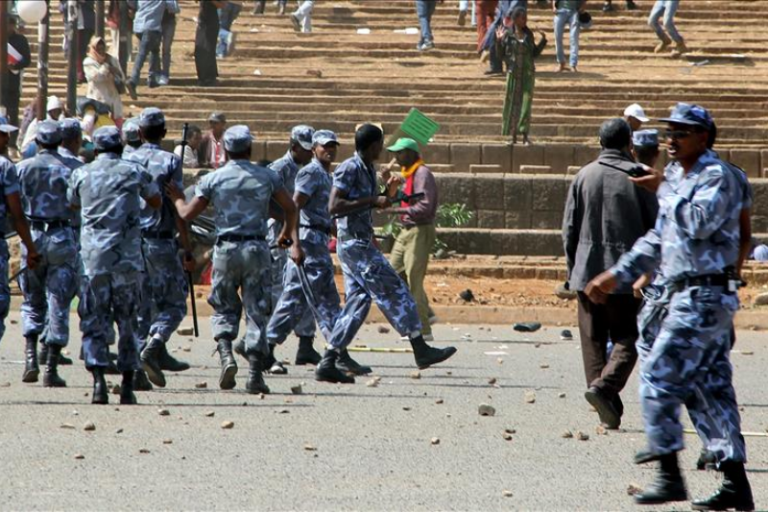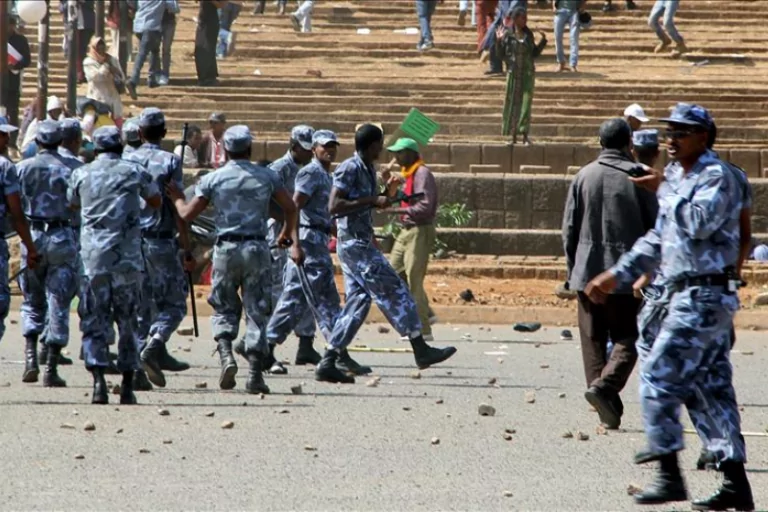

ethiopia mass arrests and unrest amidst ethnic strife
According to reports from lawyers and witnesses, the Ethiopian government is reportedly conducting mass arrests in the country’s capital city as a response to the violent violence that occurred in the Amhara area of the country.
Ethiopia’s Cabinet declared an emergency situation in Amhara earlier this month after local militia fighters known as Fano took control of several significant cities in the area. The military has subsequently used force to retake these towns. The Fano, who fought with Ethiopian armed troops in a struggle that lasted for two years in the neighboring Tigray area, have resisted being disbanded following a peace settlement that was reached in November of last year.
On Monday, the Ethiopian parliament was to vote on whether or not to formally approve exceptional powers that give officials the ability to arrest people without a warrant, perform searches, and impose curfews. Tens of thousands of people of Tigrayan ethnicity were picked up across the country under the previous state of emergency that had been proclaimed during the Tigray war.
This time, the state-established Ethiopian Human Rights Commission stated on Monday that “there has been widespread arrest of civilians who are of ethnic Amhara origin,” and it urged the federal authorities to stop carrying out the detentions. According to activists, people of Amhara ethnicity are the primary target of the mass arrests.
After being swept off the streets, suspects are being kept at police stations, schools, and other makeshift detention centers in the capital city of Addis Ababa, according to the statements of two attorneys. The attorneys, along with other individuals, spoke with the understanding that they would remain anonymous out of fear of reprisal.
According to one lawyer, he went to seven schools and police stations during the previous week where “hundreds” of people were being kept. According to the other lawyer, who cited sources within the police department, 3,000 people had been arrested in Addis Ababa. A third attorney has stated that he met several young people who had been arrested and suspected of having links to the Fano militia during the past week in Addis Ababa at various police stations and courts.
One man of Amhara ethnicity claimed that the week before, plainclothes police officers took him into custody after overhearing him discussing the recent unrest on the phone and deciding to take him off the street. He claimed that he and several hundred other people were detained at a school before being transported to a police station. On Thursday, he was given his freedom without facing any charges.
Another individual stated that his brother was taken into custody in Addis Ababa a day prior to the declaration of the state of emergency and is currently being held at a school together with several hundred other people. The man, who has gone there twice to check on his brother, stated that the majority of the inmates there are young boys.
According to the statements made by the federal administration, there have been a total of only 23 arrests made in Addis Ababa since the state of emergency was declared. Among them is Christian Tadele, an outspoken opposition politician who, according to the Constitution of Ethiopia, ought to enjoy immunity from arrest because he is a member of the parliament. “No suspect has been arrested apart from these 23 individuals, and the information that is circulating that there are mass arrests is wrong,” the communication service for the federal government stated in a statement released on Friday.
On Saturday, the Ethiopian Human Rights Commission advocated for the state of emergency to be restricted to a duration of one month and “to the specific place where the special danger is said to have occurred, rather than applying it throughout the entire country.” The commission announced on Monday that it had documented “heavy fighting in and around cities and towns across the Amhara region, which involved the use of heavy artillery, resulting in the deaths and injuries of civilians, as well as damage to property.”
According to the report, jails and police stations in the region had been broken into, and Amhara regional officials had been the target of attacks, leading to the deaths of several of them and “resulting in the temporary collapse of local state structure in many areas.”
Creative Africa Nexus (CANEX) is running the Book Factory Prize for Publishing in Africa again to award $28,000 to African…
Canadian companies have expanded their presence as major African mining stakeholders and invested more than $37 billion. Africa holds the…
The South African government wants people to plant one million trees across the nation within a single day on September…
The government's statistics regulator showed that South African inflation stayed at 3.2% during February and rose below the projected 3.3%.…
Keywords: Cape Town, African Energy Chamber, Africa, The 2025 African Energy Week (AEW) will host the top energy leaders from…
Recent research shows that Professor Abdessamad Faik believes Africa is at an important energy choice point as renewable-powered hydrogen allows…
This website uses cookies.